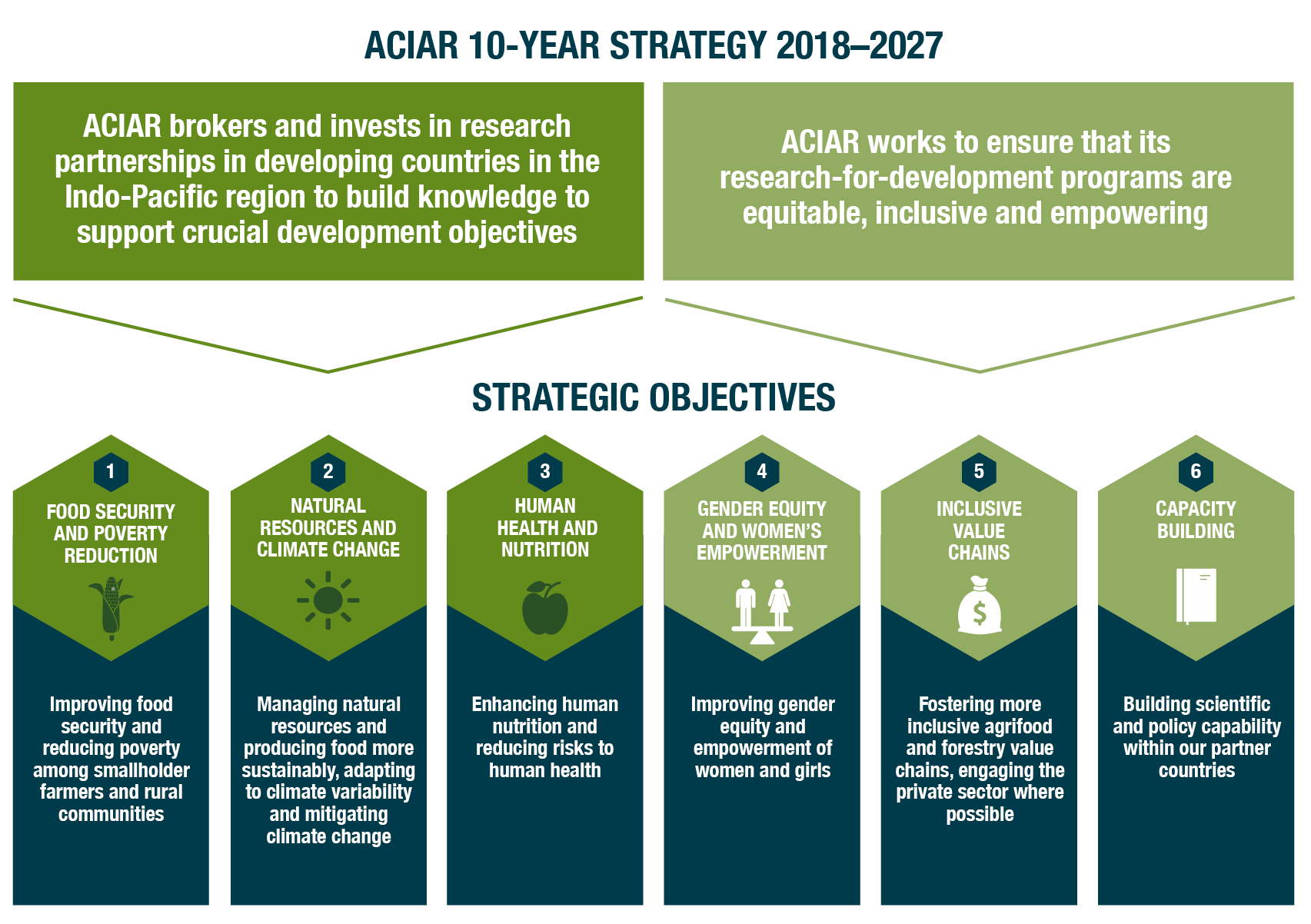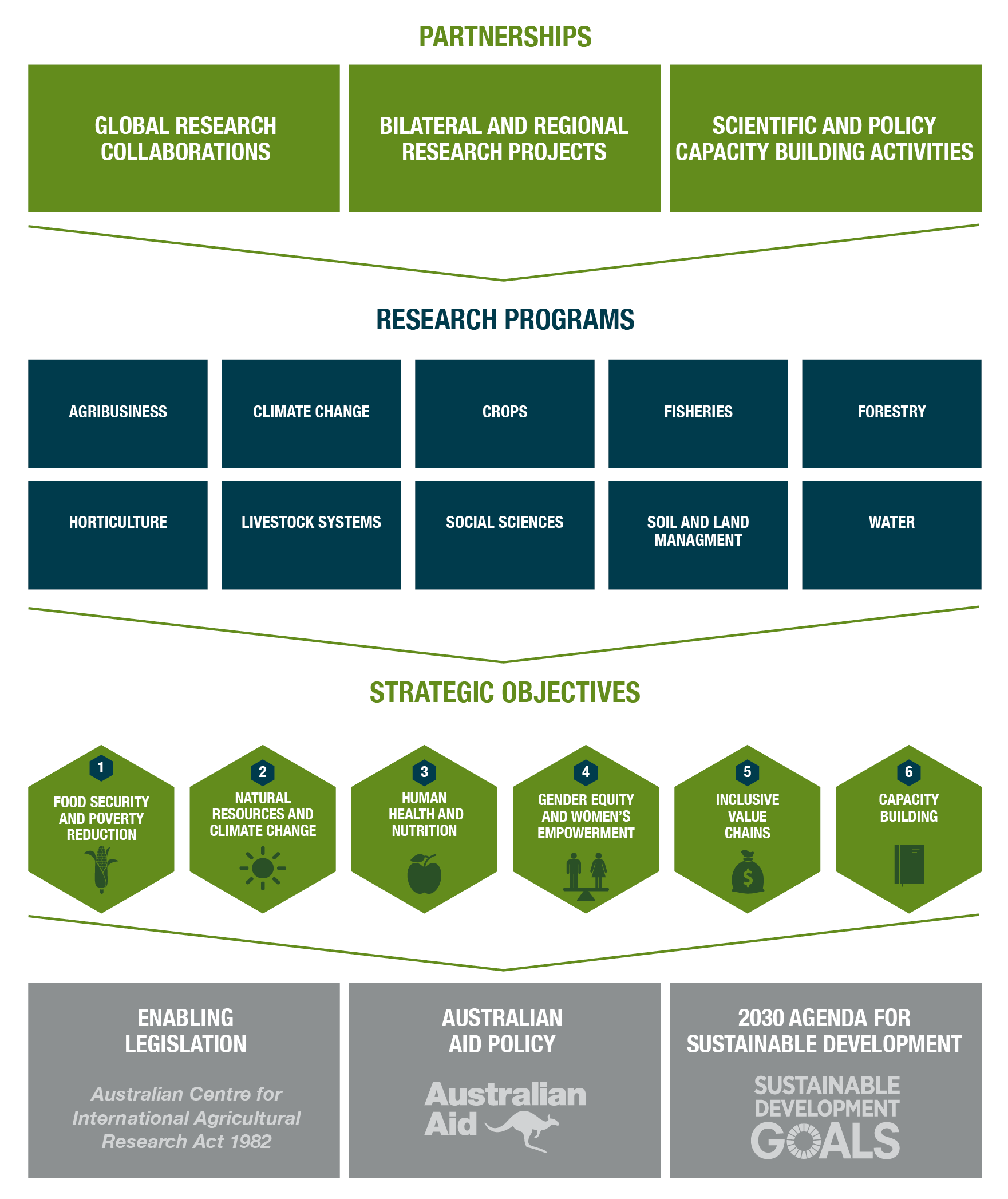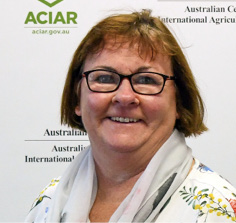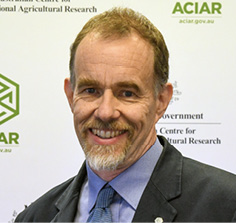The Australian Centre for International Agricultural Research (ACIAR) works with regional partners to tackle the intersecting and complex challenges of growing more food, improving human nutrition and reducing poverty while using less land, water and energy. At the same time, we must adapt to and mitigate the effects of climate change.
As an agency of the Australian Government, the purpose of ACIAR is to contribute to reducing poverty and improving the livelihoods of many in the Indo-Pacific region, through more productive and sustainable agriculture that emerges from collaborative international research.
We support research collaboration to improve livelihoods in agriculture, fisheries and forestry, while emphasising individual and institutional capacity building and opportunities for development led by the private sector. This work also focuses on economic diplomacy and women’s economic empowerment.
Our work reflects Australian Government policy imperatives articulated in the:
- Australian Overseas Development Assistance policy framework
- Sustainable Development Goals of the United Nations 2030 Agenda for Sustainable Development
- Paris Agreement under the United Nations Framework Convention on Climate Change.
Diversity and flexibility are key to our work, but it is equally important that all programs, projects and partners are working towards common objectives and goals.
The ACIAR 10-Year Strategy 2018–2027 sets out six high-level strategic objectives that guide our partnerships and research programs. These objectives are consistent with the purpose stated in our enabling legislation and reflect the policy imperatives of the Australian Government. Three of these objectives build knowledge to underpin crucial development objectives, and three ensure that our work is equitable, inclusive and empowering.
2020–21 operating environment
ACIAR has well-established ongoing plans and programs to ensure continuity in building the partnerships, knowledge and capacity required to achieve more productive and sustainable agricultural systems in the Indo-Pacific region. These plans have been developed in the context of a changing climate and the triple burden of nutrition (acute hunger, malnutrition and nutrition-related disease) that many partner countries face. However, all plans and operations must now take into account the immediate and unfolding impact of the COVID-19 pandemic.
Responding to COVID-19
The COVID-19 pandemic is a global health and economic crisis that will disrupt the lives and livelihoods of diverse communities around the world for years to come. While the global health crisis of COVID-19 is yet to precipitate a global food crisis, many international experts and agencies have highlighted that risk. In May 2020, ACIAR commenced an assessment of the impacts of the pandemic, and the responses to it, on smallholder farmers and food systems in the Indo-Pacific region. Two reports have been published on the ACIAR website:
The ACIAR response to the pandemic reflects the Australian Government’s policy, articulated in Partnerships for Recovery — Australia’s COVID-19 Development Response, published on the website of the Department of Foreign Affairs and Trade.
Australia is a world leader in biosecurity and One Health—the intersection of animal, human and environmental health. Like severe acute respiratory syndrome (SARS), Middle East respiratory syndrome (MERS), Ebola and human immunodeficiency virus (HIV), COVID-19 is a zoonotic disease that has ‘spilled over’ from animals to humans. Strengthening a One Health approach—developing far more effective integration across the human and animal health systems in regulatory systems, surveillance, diagnostics and response—is critical if our region and the world is to prevent even more infectious and deadly zoonotic diseases.
ACIAR is well placed to harness the strengths of the Australian agricultural innovation system in these areas to provide scientific leadership in our region. As many countries tackle the multifaceted challenge of ‘building back better’, a key aspect will be improving the safety and resilience of food systems. Our response to the COVID-19 pandemic is central to our first strategic objective of ‘improving food security and reducing poverty among smallholder farmers and rural communities’ in our region.
Regional stability and economic security
Australia’s security and economic interests remain linked with the countries of the regions in which ACIAR operates. The Australian Government’s investment in agricultural development, through ACIAR, supports regional processes for promoting peace and economic growth, ensuring Australia is a trusted science partner and leader in the agriculture and natural resources sectors.
Redesigning the way we work
On a broader scale, the work of ACIAR and our partners will be vital in the next few years. Smallholder farmers in the Indo-Pacific region need to have the knowledge, skills, technology and frameworks to restore disrupted production systems and value chains across the agriculture, fisheries and forestry sectors. The breadth of the ACIAR research portfolio underpins the significant and valuable contribution that we make in our region—from the sciences that support productivity, biosecurity and sustainability to the disciplines that support the development of effective value chains, adoption processes, policies, regulations and institutional arrangements.
In the coming 12 months, and beyond, we will be reshaping our traditional operating models that have depended heavily on international travel by Australian scientists to partner countries, extensive regional travel within partner countries, and travel to Australia for training by scientists from partner countries. While a global crisis accelerates this remodelling, it also presents new opportunities to experiment with new technologies and new modalities to achieve our purpose more efficiently.
The reviews, development and innovation we undertake in response to the COVID-19 pandemic will strengthen our business models and allow us to continue working with our partners on ongoing social, economic and environmental challenges. This will almost certainly mean even closer links with the more than 800 ACIAR alumni across our region, as we seek to maintain on-ground momentum within ACIAR-funded programs and projects.
Working in a changing climate
Our second research-based objective is ‘managing natural resources and producing food more sustainably, adapting to climate variability and mitigating climate change’. To focus and strengthen our capacity to work towards this objective, ACIAR will establish a new Climate Change Research Program. This new program will focus on agriculture’s contribution to climate change, and opportunities to reduce greenhouse gas emissions from the agriculture, fisheries and forestry sectors in our region. Many of our partner countries are interested in tapping into deep Australian expertise developed through, for example, the Carbon Farming Initiative, as they seek to meet their own nationally determined emissions reduction contributions to the Paris Agreement. Adaptation to climate change and extreme weather events is woven through all ACIAR research programs and will continue to be a cross-cutting issue throughout the portfolio.
ACIAR will consolidate Australia’s reputation and expertise in climate science in agriculture when chairing the Global Research Alliance for Agricultural Greenhouse Gases in 2020–21. This alliance of more than 60 countries acknowledges the significant challenge of meeting a dramatic increase in global food demand, while reducing the contribution of the agriculture sector to greenhouse gas emissions.
The focus of the alliance is to foster research collaboration. Leading Australian researchers will
play an important role in the alliance, often through ACIAR-supported projects.
Building healthier food systems
Leaders in farming, business, science and government recognise that if the United Nations’ Sustainable Development Goals are to be achieved by 2030, there must be a global transformation in how food is produced, processed, distributed and consumed (CGIAR Research Program on Climate Change, Agriculture and Food Security website, accessed July 2020).
ACIAR works across the Indo-Pacific region with the strategic objective of ‘enhancing human nutrition and reducing risks to human health’. In our region, there are countries, provinces and communities experiencing the triple burden of nutrition—acute hunger and malnutrition alongside increasing levels of obesity and diet-associated diseases, such as diabetes and heart disease.
During 2020–21, ACIAR will continue to develop partnerships and broker research relationships that address the many factors that influence the nutritional value of food harvested and the safety of the food production system. Our current research portfolio includes projects such as:
- analysis and policy development to address the paradox of apparently abundant fish, vegetables and root crops but poor public health outcomes in Pacific island countries
- investigation of safe use and reduced application of pesticides in fruit and vegetable production in the Philippines
- identification of food safety interventions in the pork value chain in Vietnam.
Operational and supporting structures
Through ACIAR partnerships, we will continue to grow the knowledge base for farming and food systems, and in turn, improve livelihoods of smallholder farmers and fishers in our partner countries. Along the way, we will introduce new technologies, risk management and capabilities to Australian agriculture and agricultural sciences, generating a very high return on public investment.
Our work is planned around three key areas.
- Global research collaborations: We develop and foster partnerships and relationships with other international research and development agencies. One integral partner is CGIAR. We also develop and foster partnerships with development donors and the private sector to pursue shared goals and ensure that ACIAR-funded research results are implemented at scale.
- Bilateral and regional research projects: We generate knowledge from ACIAR projects and programs to empower smallholder farmers, extension agents, scientists and policymakers to take on the intersecting challenges of growing more and healthier food and reducing poverty while using less land, water and energy.
- Scientific and policy capacity building: We identify and establish opportunities for individuals and institutions in partner countries to boost technical, policy and management skills in agriculture, fisheries, forestry and management of land and water resources.
The ACIAR Gender Equity Policy and Strategy 2017–2022 informs the design and implementation of our research activities with partners, and our own internal organisation. Many ACIAR projects work towards improving women’s access to resources and decision-making, as this is a direct route to reducing poverty and boosting food security at family, community and societal levels. There is compelling evidence, in both the public and private sectors, that organisations drawing equally on the talents of women and men at all levels outperform those that do not. Within ACIAR, the proportion of senior positions occupied by women increased from 11% in 2016 to 58% by June 2020.
To measure our performance and ensure alignment with our strategic objectives, we continue to develop and implement our portfolio planning and impact evaluation processes. This enables us to design effective research-for-development projects and programs, and develop methods to appropriately monitor and assess the contribution of our investments to development outcomes across our whole portfolio. The process also informs our accountability to the Minister for Foreign Affairs, the Australian Government and the Australian public.
Development of national skills and knowledge
ACIAR-funded research primarily helps smallholder farmers and rural communities in developing countries, but it also continues to deliver benefits to Australian agriculture through new production technologies, access to improved crop varieties, protection from pests and diseases, and increased skills and knowledge of Australian researchers.
While building knowledge and capacity to contribute to stability and prosperity in our region, it is also important that we look at our own agency and ensure we are operating in line with initiatives for comparable agencies across the Australian Public Service. We will achieve this through continuous review and implementation of efficiencies in the way we operate, as well as reviewing and applying robust risk-management processes, overseen by the ACIAR Audit Committee.
During 2020–21, new Commissioners and a new Chair will be appointed to the Commission for International Agricultural Research (the Commission). The Commission’s critical governance role under the ACIAR Act is to provide strategic advice to the Minister and the Chief Executive Officer (CEO) of ACIAR. The Commission will continue to play an important role as a sounding board and source of strategic advice for ACIAR as we develop and refine new business models in response to a radically disruptive global pandemic.While building knowledge and capacity to contribute to stability and prosperity in our region, it is also important that we look at our own agency and ensure we are operating in line with initiatives for comparable agencies across the Australian Public Service. We will achieve this through continuous review and implementation of efficiencies in the way we operate, as well as reviewing and applying robust risk-management processes, overseen by the ACIAR Audit Committee.
The Commission is complemented in the governance architecture of ACIAR by the Policy Advisory Council, comprising eminent international experts from our partner countries. The role of the Policy Advisory Council under the ACIAR Act is to advise the Minister and ACIAR on the agricultural problems of developing countries, providing rich contextual detail and insight that informs the design and implementation of ACIAR-funded research. The Policy Advisory Council has played an important role in providing feedback on the early phases of our rapid assessment of food system risks and resilience. It will be a valuable source of advice as we begin to design intervention options in response to the assessment.
An enduring operational model
Ensuring that the best of Australian science can be combined with local knowledge and implemented effectively in the field depends on the quality and durability of partnerships between scientists and farmers, researchers and industry, government and academia. Our outstanding track record of building and sustaining deep, trusting partnerships over the last 38 years is now a great strategic asset as we seek to help partner countries meet unprecedented challenges in the face of travel and other restrictions.
The ACIAR business model of brokering science partnerships in agriculture, fisheries and forestry between the Australian innovation system and neighbouring countries in our region is even more relevant today than when ACIAR was established in 1982. The strength of these partnerships enables us to be flexible and responsive in transforming how we work in response to unprecedented disruption.
During 2020–21, the ‘how’ of our work may evolve faster than in any previous period, but the ‘why’ and the ‘what’ are enduring.
High return on investment
Independent evaluations of ACIAR projects and programs have consistently found high returns on investment. These returns are, on average, 5:1 but in some instances are as high as 60:1.
These findings are consistent with studies by the United States Agency for International Development in 2017 that unequivocally concluded that lifting agricultural productivity in ways that help smallholders to access higher-value markets is among the most effective forms of international development for reducing poverty and catalysing economic growth.
ACIAR partnership model
ACIAR regions and partner countries
Enlarge map







